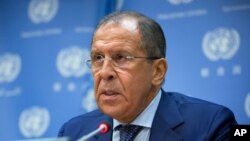Russia’s move to deepen its involvement in the Syrian conflict may have more to do with a long-term strategy of widening its influence than its stated goal of helping the Assad regime fight militants, say analysts studying the crisis.
“The Russians are interested in several things in Syria,” said Christopher Kozak of the Institute for the Study of War. He said its airstrikes, which entered a second day Thursday, allow Moscow to achieve multiple goals at once.
Kozak said Russia’s more aggressive stance in Syria gives it “leverage” against the U.S. and its anti-Islamic State coalition that has been fighting militants in Iraq and Syria.
Also, Russia is interested in the survival of President Bashar al-Assad’s regime because it wants to protect its military interests in Syria.
“Russia would greatly prefer to keep someone in their axis of power in Syria,” Kozak said.
He also said the stepped-up involvement in Syria takes the spotlight off Ukraine, where Russia has faced criticism from the U.S. and other world powers for its support of rebels.
“When you put all of this evidence together, this actually allows Russia to apply several different layers of torque,” said Kozak, “in order to assert itself in the region and on the international stage.”
A bigger goal
The White House said Russia is pushing itself into further isolation by carrying out airstrikes over Syria.
"The fact is that carrying out indiscriminate military operations against the Syrian opposition is dangerous for Russia," said spokesman Josh Earnest.
But Russia may believe its strategy will have the opposite effect, said Blaise Misztal, national security program director at the Bipartisan Policy Center.
“There is a bigger goal here, which is really, in some way, overtake the United States as a global actor,” he said.
He said Russia also wants to make sure that even if Assad leaves, what remains in Syria is a regime in which Russian interests are represented.
The U.S. and Russia have shown a willingness to cooperate on some aspects of the Syrian conflict, although they have different views on Assad's fate.
U.S. and Russian military officials held a teleconference Thursday to discuss ways they can avoid firing on each other in Syria. A Pentagon spokesman described the conversation as cordial.
Russian targets
Russia's defense minister said in a televised report that Russian aircraft had hit a dozen Islamic State targets in Syria, including a command center and two ammunition depots.
The Kremlin acknowledged, however, that it also was taking aim at "a list" of groups beyond the extremist group.
Observers said the Russian airstrikes were targeting not only Islamic State extremists, but also moderate opposition fighters backed by the United States.
But at a U.N. news conference Thursday, Foreign Minister Sergei Lavrov said Russia and the U.S. see “eye to eye” when it comes to the designation of terrorists in Syria.
Lavrov said that the U.S.-led coalition said its targets are IS militants, the al-Qaida-affiliated al-Nusra Front and other terrorists.
“This is basically our position as well,” he said.
Asked whom Russia viewed as a terrorist in Syria, Lavrov replied, “If it acts like a terrorist, if it walks like a terrorist, if it fights like a terrorist, it’s a terrorist — right?”
U.S. Secretary of State John Kerry, asked whether he agreed with Lavrov that the two countries were targeting the same people, said, "Well, in concept, but we are not yet where we need to be to guarantee the safety and security and division of responsibility."
Assad's role
Although Russia and the U.S. are willing to cooperate militarily, their differing views on Assad’s future role in Syria will continue to be a barrier.
In an “immediate and tactical sense, Russia and the United States are still working against each other,” said Brookings Institution national security analyst Michael O’Hanlon.
He said a more favorable resolution to the Syrian conflict might be a negotiated autonomous arrangement, with internal lines separating the country’s major ethnic groups and international peacekeepers helping to maintain stability.





